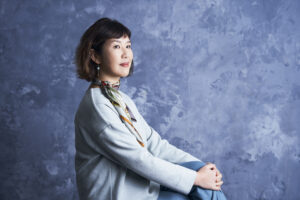 ©Ayane Shindo
©Ayane Shindo 1969年東京生まれ。東京藝術大学音楽学部附属音楽高校、同大学を経て1993年同大学院作曲専攻修了。1995年パリ国立高等音楽院作曲科、1998年同科第3課程、2000年同楽曲分析科修了。1996〜97年IRCAM(フランス国立音響/音楽の探究と調整研究所)研究員。北村昭、尾高惇忠、間宮芳生、ポール・メファノ、エマニュエル・ヌネス、トリスタン・ミュライユの各氏に師事。
さまざまな領域への関心からもたらされる着想や、繊細さとダイナミズム、多彩な音色とバランス感覚に優れたユニークな作風が各地で注目を集め、ザルツブルク音楽祭、ウィーン・モデルン、ドナウエシンゲン現代音楽祭、ヴェネツィア・ビエンナーレ、リンカーンセンター・フェスティバル、サイトウ・キネン・フェスティバル(松本)など、数多くの主要音楽祭等で作品が初演/再演される。各国のラジオ・テレビによる放送も多い。
2007年ルーヴル美術館の委嘱で作曲された無声映画『瀧の白糸』(1933、監督:溝口健二)のための音楽は、同年のルーヴルでの初演以来、毎年再演を重ね、これまでブザンソン、ストラスブール、東京、スイス、イタリア、オランダ、ルクセンブルクなどで演奏、2019年はチュニジアでの再演が予定されている。また、パリの秋芸術祭、アルス・ムジカ音楽祭(ブリュッセル)、アムステルダム・ムジークヘボウ、サントリーホール、ニューヨーク・ミラーシアター「作曲家の個展シリーズ」などでは、オーケストラやアンサンブル作品による個展が開催され好評を博す。
その他、代表作として、オペラ《パン屋大襲撃》(ルツェルン劇場、ロンドン・ロイヤル・オペラハウス他共同委嘱)、管弦楽曲《むすびII》(ブザンソン国際指揮者コンクール課題曲)、《むすび》(東京フィルハーモニー交響楽団創立100年記念委嘱)、《ニライ》(バイエルン放送響委嘱)、《ニグレド- R.シューマン讃-》(新日本フィルハーモニー委嘱)、《インスラオヤ》(サントリー音楽財団委嘱)、《クラウドナイン》(NHK交響楽団委嘱)、《メテオリット》(読売日本交響楽団委嘱)、《ホメオボックス》(ベルリン・ムジークビエンナーレ委嘱)、《カメラ・ルシダ》(SWR南西ドイツ放送局委嘱)、弦楽四重奏曲《Brains》(ラジオフランス委嘱)、《Boids》(クロノスカルテット委嘱)、《赤い大地》(フランス文化省委嘱)、アンサンブル作品《キメーラ》《ワイズ・ウォーター》(ともにWDR西ドイツ放送局委嘱)、《4D》(フランス文化省委嘱)など。最近作に、共通善経済をテーマにした《パントポス》(ヴィデオとアンサンブル)、アイデンティティの問題をとりあげた《Têtes》[顔/頭](歌手とアンサンブル)がある。
1995年第64回日本音楽コンクール作曲部門第1位及び安田賞、1998年ダルムシュタット・シュティペンディエン賞、1999年ユネスコ国際作曲家会議推薦曲(パリ)、2000年芥川作曲賞、2002年アルスムジカ音楽祭聴衆賞(ブリュッセル)、2003年芸術選奨文部科学大臣新人賞、出光音楽賞、 2005年尾高賞、2008年ユネスコ国際作曲家会議グランプリ(ダブリン)、2010年ハイデルベルク女性芸術家賞を受賞。作品はBreitkopf&Härtel社より出版、CD作品集がKairos(2002年)、Neos(2014年)の各レーベルよりリリースされている。
講演や作曲の講師として招聘されることも多く、社会や芸術に関する幅広い興味や知識に裏付けられた講義、また2008年より8 年間読売新聞に連載した「音楽季評」や、2018年1月〜6月 の日本経済新聞連載「プロムナード」をはじめとする執筆活動も高く評価されている。2019年、日本経済新聞連載コラムを中心とするエッセイ集『作曲家が語る音楽と日常-パリと日本を行き来して-』(海竜社)を上梓。
これまでに、ダルムシュタット国際夏期講習会(ドイツ)、ロワイヨモン国際作曲セミナー、コレージュ・ド・フランス、ニューヨーク・コロンビア大学、アムステルダム音楽院、カタロニア高等音楽院(ESMUC)、Mixtur フェスティバル(バルセロナ)、ニース・CIRM(国際音楽研究センター)、パリ・エコール・ノルマル音楽院、ウィーン芸術写真学校、ア・テンポ音楽祭(ベネズエラ)、武生国際音楽祭等で講師を務める。2011~2013年にはブザンソン国際音楽祭コンポーザー・イン・レジデンスとして指揮者コンクール課題曲作曲および審査のほか、地域の大学、音楽院、美術学校などでの講演やワークショップ、演奏会を数多く行った。
現在、明治学院大学文学部芸術学科教授、東京藝術大学音楽学部作曲科客員教授。
2024年4月より朝日新聞書評委員に任命。https://book.asahi.com/reviews/reviewer/11013439
Born in 1969 in Tokyo, Misato Mochizuki is amongst those composers who are equally active in Europe, North America and in Japan. After receiving a Masters degree in composition at the National University of Fine Arts and Music in Tokyo, she was awarded first prize for composition at the Conservatoire National Supérieur in Paris in 1995, and then integrated the “Composition and Computer Music” program at IRCAM (1996-1997).
In her very own combination of Occidental tradition and the Asiatic sense of breathing, Misato Mochizuki’s style of writing developed exciting rhythms and unusual sounds of great formal and stylistic freedom. Her catalogue of works (published by Breitkopf & Härtel) consists of about 60 works today, including 16 symphonic compositions and 15 pieces for ensemble. Her works, which have been performed at international festivals such as the Salzburg Festival, the Biennale di Venezia, Lincoln Centre Festival, Music days in Donaueschingen, Berlin, Witten, Cologne, Lyon, Zurich, Toronto and so on, have received numerous awards; the audience prize at the Festival Ars Musica in Brussels for Chimera in 2002, the Japanese State Prize for the greatest young artistic talent in 2003, the Otaka Prize for the best symphonic world premiere in Japan in 2005 (for Cloud nine), the Grand Prize of the Tribune internationale des compositeurs in 2008 (for L’heure bleue), and the Heidelberg Women Artists’ Prize in 2010. Her most outstanding productions include the orchestral portrait concert at Suntory Hall in Tokyo (2007 and 2019), the cinema concert at the Louvre with the music to the silent film Le fil blanc de la cascade by Kenji Mizoguchi (2007) and the portrait concerts at the Festival d’Automne in Paris, Muziekgebouw aan’t IJ in Amsterdam (2010) or at Miller Theatre in New York (Columbia University, 2017).
Between 2011 and 2013 Misato Mochizuki was composer-in-residence at the Festival international de musique de Besançon and did lots of workshops and conferences as well as jury of the renowned young conductors’ competition, for which she wrote a symphonic piece (Musubi II) for finalists.
Since 2007 she has been professor of artistic disciplines at the Meiji Gakuin University in Tokyo, and has been invited to give composition courses in Darmstadt, in Royaumont, in Takefu, in Paris (at ManiFeste, at Collège de France), in Barcelona (Mixtur and ESMUC), at the Amsterdam Conservatory, Columbia University and so on. Within the framework of her activities, she continually reflects on the role of the composer in today’s society and on the necessity to open oneself to it. In addition, Misato Mochizuki writes about music and culture in her own column every three months for the Yomiuri Shimbun (2008-2015), every week for the Nihon Keizai Shimbun (January to June 2018) , most widely read daily newspapers in Japan. In November 2019, some of these writings are published as a book (“The composer’s reflection on music and daily life”, in Japanese, Kairyusha).

